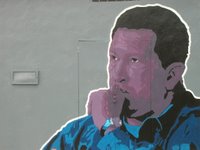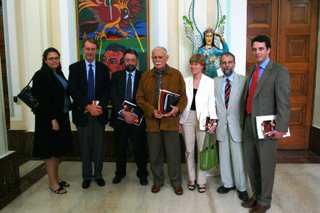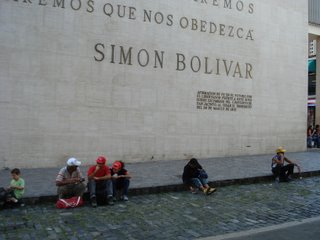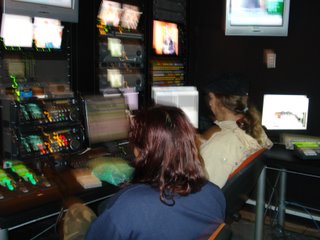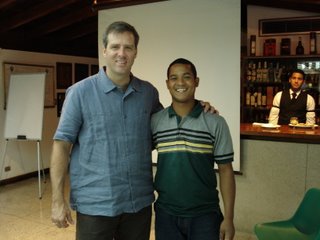
A visit to Project Alcatraz: Today the delegation met four former gang members in a town called El Consejo, about fifty miles outside of Caracas in Revenga County, and heard an amazing story about how they are turning their lives around.
Revenga has about 26,000 residents. Like other places in Venezuela, it is poor: there is sixty percent unemployment in the area; 15% of residents suffer from malnutrition; 65% of the children are born to unwed mothers; and 60% leave school before receiving a high school diploma. These are places where some of the excluded and dispossessed who lead the hardest lives in Venezuela become its hardest-core criminals. Many of the rest are sentenced to living lives with no identity and no future.
Six years ago, during a campaign in Venezuela, when all levels of government were up for reelection, some candidates advised Venezuela’s poor that if they needed something, they should just take it. In Revenga, 479 families crossed the border onto the Hacienda Santa Teresa, the site of Venezuela’s most esteemed rum producers, and occupied land that had been privately held for more than 200 years.
Alberto Vollmer, scion of the family that runs Santa Teresa, took the lead in dealing with the land invasion crisis. He could have done nothing. He could have enlisted the police to apply force, or hired private security to remove the families himself. Instead, he did something unexpected and uncommon in Venezuela: he engaged the land invaders in a negotiation, and treated the people occupying his land with dignity and respect.
Vollmer’s negotiation led to a landmark agreement. The occupiers stayed, but rather than building a slum, they agreed to work with Vollmer and plan a new community. The state government donated infrastructure, the central government provided credit to build housing, and the residents donated their labor to build their homes.
Vollmer explained to us that his family had engaged in a social philanthropy for years, assisting local residents on projects relating to education and health. But the advent of the settlement on his land provided their work with a new focus that he believes will really address, at least locally, the social inequality faced by Venezuela’s poor, with pragmatic solutions that are sustainable over time. Vollmer’s family and company have literally become instruments for the community to change and improve itself.
Their projects focus on housing, training for the unemployed, education, security (anti-crime efforts), values, and giving residents a vision for the future. The Santa Teresa foundation is helping the community create a sustainable tourism industry in the region, where residents will be trained for real jobs, artists will have assistance in building markets for locally produced goods, and scores of people who would have faced a future of anonymity and idleness are acquiring an identity and a sense of purpose.
As Vollmer explained, the crime effort started when a Santa Teresa employee was badly assaulted, and the firm’s security chief was able to identify and track down the assailants. Vollmer met with the young gang members who committed the crime, and offered them a deal: work a job at the hacienda for three months for no pay and apologize to the victim, or face incarceration at a local prison. Once again, Vollmer’s approach, rejecting force or confrontation and favoring negotiation paid off. The gang members worked and they liked it, and Vollmer built on what happened with this incident to do outreach with the gangs in Revenga whose activities were driving the ferocious local crime rate.
Vollmer started a three-tiered program for gang members which they now call Project Alcatraz. Upon joining the program, they enter a boot camp which pays no wages. The second phase offers training for up to two years with a stipend. The third phase helps them find work and pays a monthly salary.
Vollmer has steadily brought more and more gang members in. He’s involved four gangs and engaged them in an honest and transparent dialogue. He reached out to their families, girlfriends and wives. They’ve sought substitute economic activities for the gang members so that renouncing crime becomes a real option, not an unthinkable economic sacrifice. He got them to think about their future.
Vollmer is reality-based; he runs a $50 million business. But he speaks clearly and powerfully about this unique project. He’s enlisting the criminals to fight crime. He’s channeling the energy of the gang leadership to make useful changes in their communities. And crime is now down 97% in communities where gang activity was at its most intense.
These creative and brave efforts have captured the attention of Venezuela’s president, Hugo Chavez, and international organizations, like the Inter-American Development Bank, which are hoping to replicate their success in dealing with crime and gangs in Central America and elsewhere.
The gang members who spoke with us talked passionately about Project Alcatraz. The project, one said, “has pushed us to have a different life.” Another said, “Before the project, my life was in a terrible hole. The program,” he said, “educated us as human people.”
This encounter did not take place at a community center or at a scene of high security. Our conversation occurred at the Santa Teresa hacienda, where the rum and the Vollmer family fortune are made. Alberto Vollmer greeted the four young men like brothers, and they passed easily into a rainy afternoon when our discussion came to an end.
